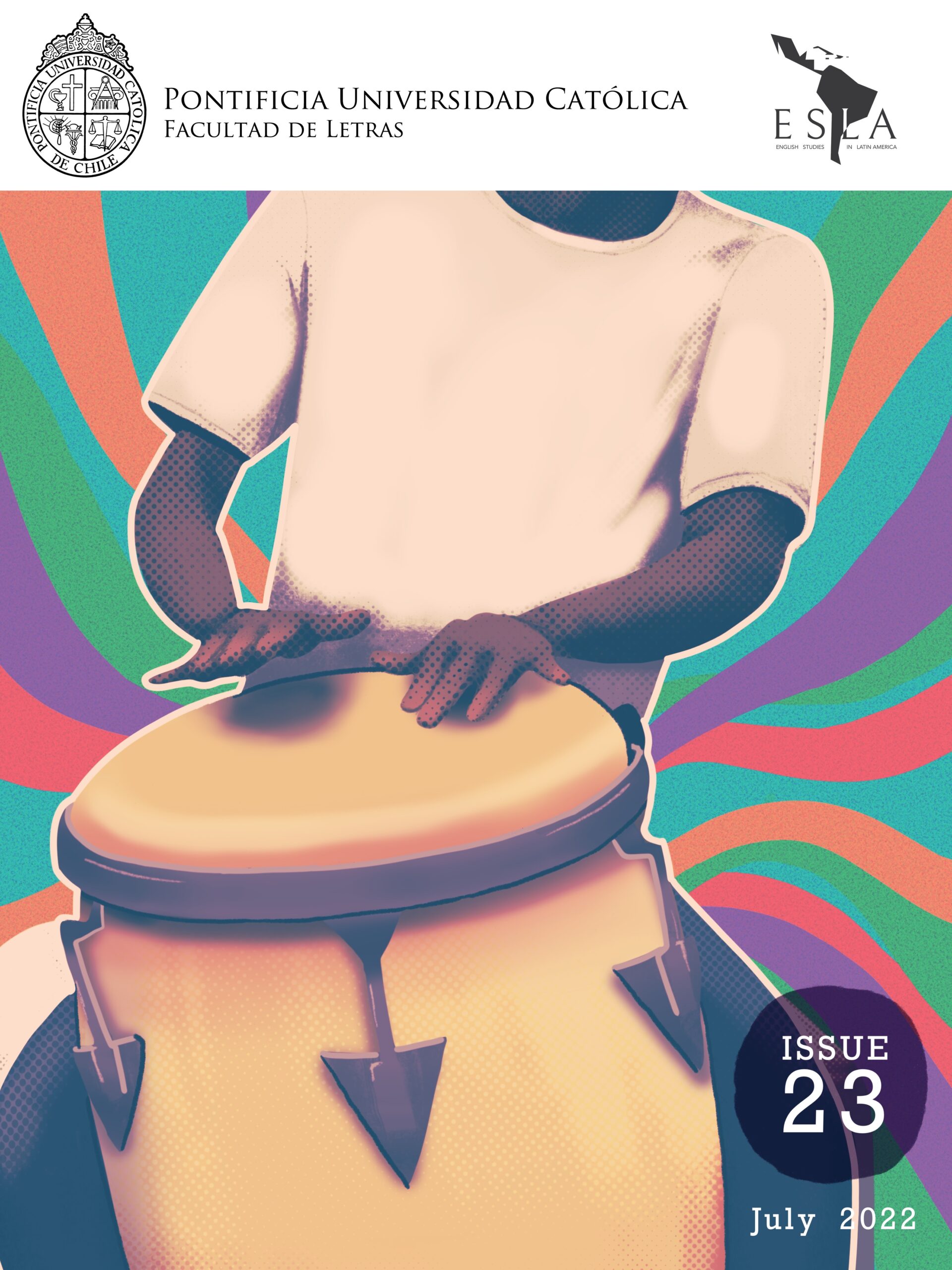
| Editor’s Note | Dear Readers, This fall-winter semester in the Southern Hemisphere brought the joy of in personThis fall-winter semester in the Southern Hemisphere brought the joy of in personacademic life after two years of online teaching because of the Covid 19 pandemic. The patiospacked with first, second, and third-year students, many of whom had never been in a universityclassroom, filled our hearts and their presence also elicited thoughts about the importance ofhuman encounters and the impact of living in such a globalized world. ESLA’s Issue 23 featurestwo articles and one essay that ponder upon these impacts. [ . . . ] Andrea Casals-Hill ESLA Editor | Download PDF |
| Articles | “The Symphony, Rhythm, and Identity in The Kingdom of this World ” By Nathan King Article Among other things, the Cuban author Alejo Carpentier is well known for his book, Music in Cuba, and for his symphonically structured work, The Chase. With that in mind, this essay takes the position that his earlier novel The Kingdom of This World is structured as a symphony. This study elaborates on why this novel is a symphony, both structurally and thematically, and how Carpentier chose the Vodou drums and chants to create rhythm. By doing this, the author creates a musical duality that mirrors his belief about Latin American identity. Identity for Carpentier means that we are forever between two worlds, such as those alluded to by the symphony (Europe) and first age rhythms (First Age cultures). The only “real” escape from this continuum is if we have the power to transform ourselves like Ti Noël at the end of the novel. Keywords: Symphony, identity, musical novel | Download PDF |
| Articles | “Cambio climático y ficción: Solar, A Novel de Ian McEwan” By Marianela Mora Article Anglophone literary production of the last two decades shows a clear tendency to imagine and narrate the impact of anthropogenic climate change. These fictions ―recently called Cli-Fi― present humanity’s agency as a geological force in the current epoch of the Anthropocene (Crutzen-Stoermer 2000). From an ecocritical reading, the article explores how the Anthropocene paradigm is presented in Solar, A Novel by the British author Ian McEwan, particularly in the representation of three axes: time, space and risk (Trexler 2015; Mehnert 2016), parameters that need resignifying in the Anthropocene. Keywords: Anthropocene, anthropogenic climate change, cli-fi, climate fiction | Download PDF |
| Non-fiction | “Theatricality and Race in William Shakespeare’s The Tempest and Raquel Carrió and Flora Lauten’s Otra tempestad” By María José Cornejo Otra tempestad was performed at La Habana’s Teatro Buendía in 1997, with dramaturgy by Raquel Carrió and Flora Lauten.2 This play marked a new direction in Latin American rewritings of William Shakespeare’s The Tempest. This tradition began with Ruben Darío, Paul Groussac and José Enrique Rodó, who discussed the image of Caliban in relation to the United States and its intervention in Latin America. The climax of these rewritings came with authors such as George Lamming, Frantz Fanon, Aimé Césaire, Kamau Brathwaite and Roberto Fernández Retamar. Their readings and understanding of the play vindicate the image of Caliban and emphasize the processes of colonization in the context of the Cuban Revolution, the Négritude Movement, and the decolonization of the Caribbean. Continuing with this tradition, Carrió and Lauten composed their play focusing on the processes of globalization and the new millennium (Flaherty 102), transferring their focus to the experimentation with new ways of understanding theatricality and Cuban identity through dialogue, establishing a counterpoint with The Tempest. Carrió herself has stated that rewriting the plot of the Shakespearean play became more complex by the end of the century (“Otra” 159). This results in a temporal and thematical distance with Césaire’s rewriting and the Caribbean tradition of the 50s and 60s because, for Carrió, it is not enough to negate the language of the colonizer but researching the process of cultural formation through cultural contact is also needed (“Otra” 159). The main gesture that the dramaturges offer comes from the title itself. By entitling it Otra tempestad (Another Tempest), Carrió/Lauten include the play in relation to Césaire’s play Une Tempête (A Tempest). […] By María José Cornejo | Download PDF |